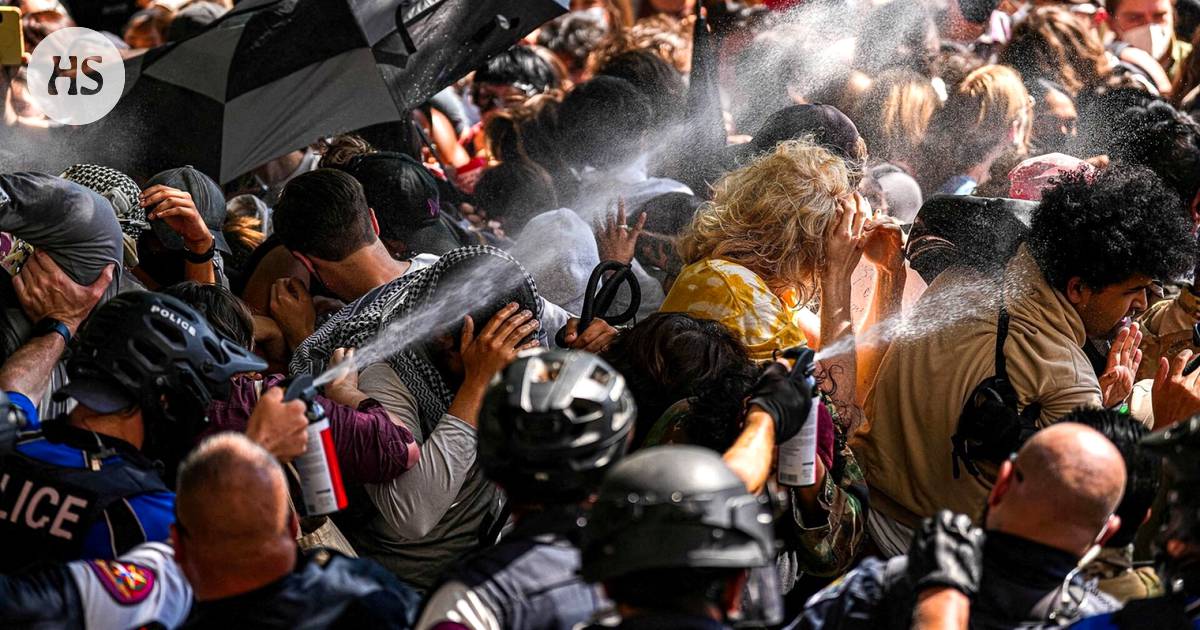Demonstrators on US university campuses are demanding, among other things, a ceasefire in Gaza.
Tensions Protests against the war in Gaza have grown even larger on US college campuses.
HS compiled what is known about the demonstrations now.
Why are demonstrations on campuses?
The demonstrations are against the ongoing war in Gaza and show support for the Palestinians.
The protesters are demanding a cease-fire in Gaza, universities to cut their financial ties to Israel and the United States to stop supporting its long-time ally Israel.
Texas State Police and protesters clashed on the University of Texas campus on Monday.
Demonstrations have been seen on university campuses across the United States. Protesters at UCLA University in Los Angeles on Wednesday.
Police arrested a protester on the Columbia University campus in New York on Tuesday.
Where do students demonstrate?
Demonstrations have been organized on university campuses across the United States, for example in New York, Los Angeles, Texas and California.
As the starting point of the spring demonstrations is held from New York’s Columbia University.
What has happened on the campuses?
American magazine The New York Timesin said more than 1,600 arrests have been made on campuses since April 18.
According to US media, the arrests have been made after the encamped protesters have refused to leave the campuses.
Only Columbia University and City College of New York have a police officer took earlier this week around 300 protesters were arrested.
Police announced Tuesday night’s arrests after they stormed the second floor of a Columbia University administration building occupied by protesters.
The police have intervened in demonstrations on other campuses as well. Early Thursday morning, police arrived at the protestors’ camp in Los Angeles on the UCLA campus.
Universities have changed their operations because of the protests. For example, Columbia University has cancelled of their classroom teaching after protesting students set up tent camps on campus in April.
PhD candidate at Columbia University Daniela described In an interview published by HS earlier this week the atmosphere in the camp last week was peaceful.
Police officers on their way to the Columbia University administration building in New York on Tuesday.
Protesters hold a sign calling for the release of Gaza on the campus of Northwestern University in the US city of Evanston, Illinois, on April 25.
Why is the situation so tense?
The protests have become a political controversy.
Aspiring to the White House again Donald Trump has encouraged responsibility for the protests to the sitting president For Joe Biden.
Republican politicians in particular have demanded that protesters be evicted from campuses by force.
Speaker of the United States House of Representatives, Republican Mike Johnson has demanded president of Columbia University Minouche Shafikia to resign because of the protests. Johnson has threatened to cut funding to universities if the protests are not brought under control.
On Thursday, Biden called on the demonstrators to moderate their protests, says STT.
“Order must be maintained,” Biden said in a televised speech from the White House.
The president added that the United States is not an authoritarian state where people are silenced. However, he warned that anti-Semitism or hate speech have no place at universities in the United States.
Critics have accused the demonstrations against the war in Gaza of being anti-Semitic, i.e. anti-Jewish, write among others The New York Times and ABC News.
Some Jewish students and teachers have felt unsafe on campuses. According to US media, anti-Semitic insults have been shouted at the demonstrations.
In addition to Biden, the mayor of New York Eric Adams has condemned the demonstrations as anti-Semitic.
However, there are also Jews among the demonstrators, who think that the demonstrations are not about anti-Semitism, but about valid criticism of Israel’s war in Gaza.
Some of the protesters have camped on the campuses with tents. A photo of Los Angeles from the UCLA campus on Wednesday.
Counter-protesters attacked pro-Palestinian demonstrators on the UCLA campus in Los Angeles on May 1.
How big are the protests?
The wave of protests could be the biggest student movement on campuses in the 21st century, according to a New York University professor who has studied student activism Robert Cohen In the Vox online publication.
According to Cohen, the expressions have not reached the scale of the student protests of the 1960s or 1980s. In the 1960s, students demonstrated in the United States against the Vietnam War and in the 1980s against apartheid.
In the 21st century, students have protested, for example, against the war in Iraq and against racism and police violence. However, according to Vox, these demonstrations have mainly taken place outside the campuses.
A protester who was pepper sprayed in the face was washed with water on the UCLA campus in Los Angeles on Wednesday.
